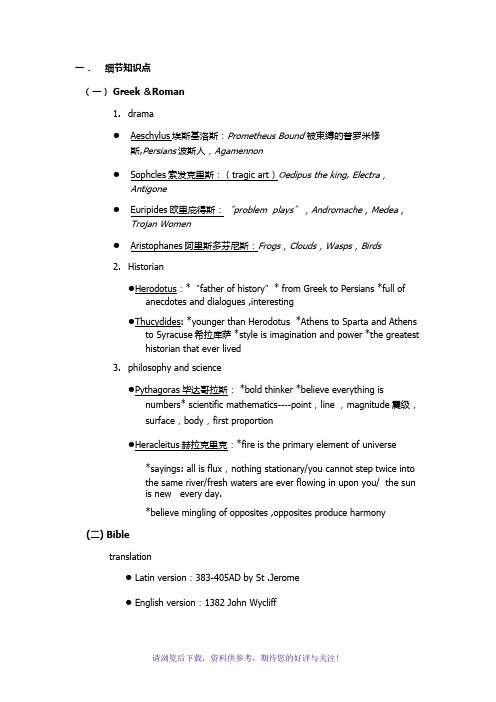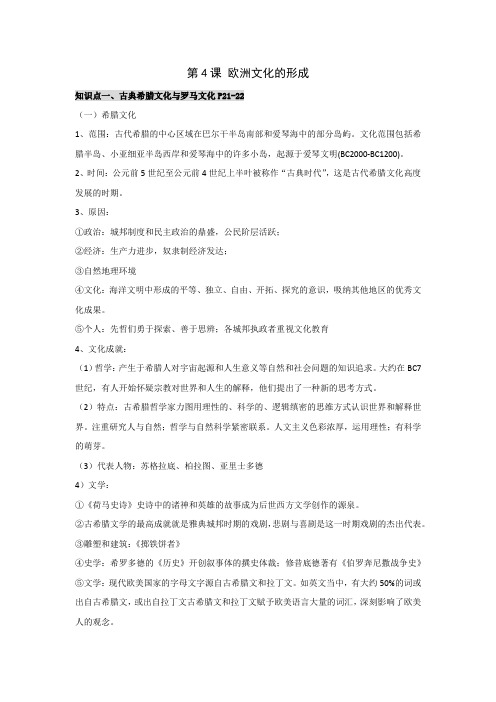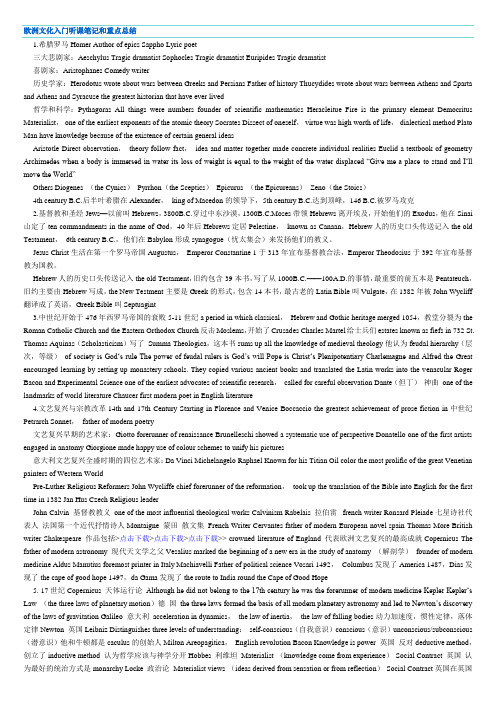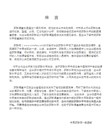欧洲文化入门听课笔记和重点总结
欧洲文化入门复习资料

一.细节知识点(一)Greek &Roman1.drama●Aeschylus埃斯基洛斯:Prometheus Bound被束缚的普罗米修斯,Persians波斯人,Agamennon●Sophcles索发克里斯:(tragic art)Oedipus the king, Electra,Antigone●Euripides欧里庇得斯:“problem plays”,Andromache,Medea,Trojan Women●Aristophanes阿里斯多芬尼斯:Frogs,Clouds,Wasps,Birds2.Historian●H erodotus:*“father of history”* from Greek to Persians *full ofanecdotes and dialogues ,interesting●T hucydides: *younger than Herodotus *Athens to Sparta and Athensto Syracuse希拉库萨 *style is imagination and power *the greatesthistorian that ever lived3.philosophy and science●P ythagoras毕达哥拉斯: *bold thinker *believe everything isnumbers* scientific mathematics----point,line ,magnitude震级,surface,body,first proportion●H eracleitus赫拉克里克:*fire is the primary element of universe*sayings: all is flux,nothing stationary/you cannot step twice intothe same river/fresh waters are ever flowing in upon you/ the sunis new every day.*believe mingling of opposites ,opposites produce harmony(二) Bibletranslation●Latin version:383-405AD by St .Jerome●English version:1382 John Wycliff(三)Middle ages/ Medieval1. AD 476 Roman power was gone2. after 1054 Church was divided into Roman Catholic and Eastern OrthodoxChurch3.The Crusades: 1096-1291 last for about 200 years4.learning:● Charlemagne查理曼大帝:*western and central Europe*father of Europe .Emperor of Romans in 800*Carolingian Renaissance加洛林*encourage Christian religion and ancient learning by setting monasteryschools● Alfred the Great阿尔弗雷德大帝:*ruler of Anglo Saxon of Wessex*Encourage teacher and scholars , Wessex center of learning*Anglo Saxon chronicles英国编年史● St .Thomas Aquinas*Italian philosopher ,scholasticism经院哲学*Summa Contra Centiles , Summa Theologiae 《神学大全》*building a society of “God’s rule””God’s will”,Pope is“Christ’splenipotentiary基督的全权代表” above secular rulers● Roger Bacon罗杰培根*a British monk ,one of the earliest advocates of experimental scientificresearch and observation*works :Opus maius ,encyclopedia of the sciences of his time5.Literature●Beowulf :an Anglo Saxon epic● Song of Roland ,La Chanson de Gestes: French● Dante:the divine of comedy神曲 greatest poet of Italy●Geoffrey Chaucer 乔叟:English poet :canterbury tales坎特伯雷故事集,(first short story teller, first modern poet in English literature )(四)Renaissance1.started in Florence and Venice, Italy2.heart of Renaissance philosophy is greatness of man ,humanism3.masterpieces :● Giovanni Boccaccio薄伽丘:Decameron十日谈(the greatest achievementof prose fiction 散文小说in the middle ages)● Francesco Petrarch彼德拉克:*discover Cicero’s Oration Oro Arochia,a Roman defense of poetry*Works: Canzoniers(lyrical), Africa,Metrical Epistles,On Contempt forthe Worldly Life,On Solitude,Ecologues, The Letters●Giotto乔托:*forerunner of Renaissance,led the way to humanism,realistic depiction of space*works: Flight into Egypt ,Betrayal of Juda s●Giorgione乔尔乔捏:Tempesta , Sleeping Venus(use of colour schemes to unify picture and most revolutionaryresult in this sphere)●Leonardo da Vinci:*painter, sculptor, architect, musician, mathematician, engineer, inventor,anatomist, geologist, cartographer, botanist, and writer.*12 paintings 5000 books ,Renaissance man in the true sense of word.*Last Supper(most famous religious pictures), Mona Lisa(most portrait)●Michelangelo Buonarroti:* an Italian sculptor, painter, architect, poet, and engineer* David ,Sistine Chapel ,Dying Slave ,Moses●Raphael:Madonna(Virgin Mary)各种圣母画,school of Athens● Rabelais拉伯雷: French ,Gargantua and Pantagruel《巨人传》● Pleiade 七星诗社:French ,leader is Pirre de Ronsard(Sonnet PourHelene) ,发扬保卫法兰西语言●Cervantes塞万提斯:Spanish,Don Quixote 1062● Erasmus:Dutch, Renaissance humanist, Catholic priest, teacher, andtheologian,Greek edition of New Testament ,Praise of Folly《愚人颂》●Durer : German ,follower of Martin Lutherthe four horsemen of apocalypse 天启四骑士knight ,death and the devil●Thomas more:英国人,Utopia乌托邦,conclusion●Shakespeare:英国人Twelfth night ,As you like it ,Hamlet,Othello,King Lear ,Macbeth,Antony and Cleopatra,Sonnets, King Henry 5,6二 .名词解释1.RenaissanceRenaissance is a period of western civilization between 14-17th century.The word Renaissance means revival .it also means the revival of interestin ancient Greek and Roman culture,which started in Florence andVenice ,Italy . the heart of~is humanism.2 . Reformation~ was a 16th century religious movement as well as a socio-political movement ,which began with Martin Luther’s 95 theses in 1517. TheReformation began as an attempt to reform the Roman Catholic Church.3.Middle ages :~is also called Medieval ,”the year of faith”* or the thousand-year period following the fall of the western roman empire in the 5th century .it camebetween ancient times and modern times .During this period Germanickingdom grew into nations such as England ,French ,Spain, Italy, Germany.4 . Feudalism~is a system of holding land in exchange for military service .the word~was derived from the Latin “feudum” , a grant of land.5 Catholic~Means” universal”. ~church was a highly centralized and disciplinedinternational religious organization .in the middle ages ,almost everyEuropeans belonged to it.6. old testament~is one of the two parts of the Bible ,which is about the God and the laws of God. Testament means agreement—the agreement between God and man.7. Pentateuch 摩西五书The oldest first five parts of the Bible including Genesis ,Exodus,Leviticus, Numbers, Deuteronomy8. doric :one of Greek architecture styles,~is also called masculine style .it’s sturdy 坚定的,powerful,severelooking ,showing sense of proportions andnumbers.Ionic:feminine style graceful and elegant,showing wealth of ornament装饰三.问答1. What happened in Western Europe after the decline of the Roman Empire?After the Roman Empire lost its predominance优势, a great many Germanic Kingdoms began to grow into the nations know as England, France, Italy, andGermany in its place. These nations of Western Europe were in the scene of frequent wars and invasions. The political unity had given way to widespread destruction and confusion. Hunger and disease killed many lives and village fell into ruin and great areas of land lay waste. There was no central government to keep the order. The only organization that seemed to unite Europe was the Christian church. Christianity was almost the all and the one of Medieval lives in western Europe and took lead in politics, law, art, and learning for hundreds years.2. What were the cultural characteristics of the period from 500 to 1000? Above all, the cultural characters of this period were the heritage and achievement of Roman culture and the emergence of Hebrew and Gothic culture.3.What made Italy the birthplace of the Renaissance?Because of its geographical position, foreign trade developed early in Italy. This brought Italy into contact with other cultures and gave rise to urban economy and helped Italy accumulate wealth which was an essential factor for the flowering of art and literature.For two centuries beginning from the late 15th century, Florence was the golden city which gave birth to a whole generation of poets, scholars, artists and sculptors. There was in Florence a revival of interest in classical learning and rising of humanist ideas.And to spread the new ideas, libraries and academies were founded.In the 15th century printing was invented and helped to spread humanist ideas.4. How did Italian Renaissance art and architecture break away from medi eval traditions?The Italian Renaissance art and architecture radically broke away from the medieval methods of representing the visible world. Compared with the latter, the former has t he following distinct features:⑴Art broke away from the domination of church and artist who used to be craftsmen commissioned by the church became a separate strata doing noble and creati ve work⑵Themes of painting and architecture changed from purely celestial realm focusingon the stories of the Bible, of God and Mary to an appreciation of all aspects of n ature and man;⑶The artists studied the ruins of Roman and Greek temples and put many of the principles of ancient civilization into their works;⑷Artists introduced in their works scientific theories of anatomy and perspective.。
第4课《欧洲文化的形成》知识点总结

第4课欧洲文化的形成知识点一、古典希腊文化与罗马文化P21-22(一)希腊文化1、范围:古代希腊的中心区域在巴尔干半岛南部和爱琴海中的部分岛屿。
文化范围包括希腊半岛、小亚细亚半岛西岸和爱琴海中的许多小岛,起源于爱琴文明(BC2000-BC1200)。
2、时间:公元前5世纪至公元前4世纪上半叶被称作“古典时代”,这是古代希腊文化高度发展的时期。
3、原因:①政治:城邦制度和民主政治的鼎盛,公民阶层活跃;②经济:生产力进步,奴隶制经济发达;③自然地理环境④文化:海洋文明中形成的平等、独立、自由、开拓、探究的意识,吸纳其他地区的优秀文化成果。
⑤个人:先哲们勇于探索、善于思辨;各城邦执政者重视文化教育4、文化成就:(1)哲学:产生于希腊人对宇宙起源和人生意义等自然和社会问题的知识追求。
大约在BC7世纪,有人开始怀疑宗教对世界和人生的解释,他们提出了一种新的思考方式。
(2)特点:古希腊哲学家力图用理性的、科学的、逻辑缜密的思维方式认识世界和解释世界。
注重研究人与自然;哲学与自然科学紧密联系。
人文主义色彩浓厚,运用理性;有科学的萌芽。
(3)代表人物:苏格拉底、柏拉图、亚里士多德4)文学:①《荷马史诗》史诗中的诸神和英雄的故事成为后世西方文学创作的源泉。
②古希腊文学的最高成就就是雅典城邦时期的戏剧,悲剧与喜剧是这一时期戏剧的杰出代表。
③雕塑和建筑:《掷铁饼者》④史学:希罗多德的《历史》开创叙事体的撰史体裁;修昔底德著有《伯罗奔尼撒战争史》⑤文学:现代欧美国家的字母文字源自古希腊文和拉丁文。
如英文当中,有大约50%的词或出自古希腊文,或出自拉丁文古希腊文和拉丁文赋予欧美语言大量的词汇,深刻影响了欧美人的观念。
⑥古希腊的民主政治:雅典民主制(典型)⑦体育:奥林匹克发源地⑧神话:BC7C前,古希腊人认为自然界和人类都是神创造的,人的一切活动都是鬼使神差的结果。
宙斯是众神之王、人类之王,人们按神谕安排事情。
(二)古罗马文化1、范围:古罗马从公元前9世纪初在意大利半岛中部兴起。
欧洲文化入门听课笔记和重点总结

欧洲文化入门听课笔记和重点总结1.希腊罗马Homer Author of epics Sappho Lyric poet三大悲剧家:Aeschylus Tragic dramatist Sophocles Tragic dramatist Euripides Tragic dramatist喜剧家:Aristophanes Comedy writer历史学家:Herodotus wrote about wars between Greeks and Persians Father of history Thucydides wrote about wars between Athens and Sparta and Athens and Syracuse the greatest historian that have ever lived哲学和科学:Pythagoras All things were numbers founder of scientific mathematics Heracleitue Fire is the primary element Democritus Materialist,one of the earliest exponents of the atomic theory Socrates Dissect of oneself,virtue was high worth of life,dialectical method Plato Man have knowledge because of the existence of certain general ideasAristotle Direct observation,theory follow fact,idea and matter together made concrete individual realities Euclid a textbook of geometry Archimedes when a body is immersed in water its loss of weight is equal to the weight of the water displaced “Give me a place to stand a nd I…ll move the World”Others Diogenes (the Cynics)Pyrrhon(the Sceptics)Epicurus (the Epicureans)Zeno(the Stoics)4th century B.C.后半叶希腊在Alexander,king of Macedon的领导下,5th century B.C.达到顶峰,146 B.C.被罗马攻克2.基督教和圣经Jews—以前叫Hebrews,3800B.C.穿过中东沙漠,1300B.C.Moses带领Hebrews离开埃及,开始他们的Exodus,他在Sinai 山定了ten commandments in the name of God,40年后Hebrews定居Pelestine,known as Canaan,Hebrew人的历史口头传送记入the old Testament,6th century B.C.,他们在Babylon形成synagogue(忧太集会)来发扬他们的教义。
“欧洲文化入门”课程学习指南

“欧洲文化入门”课程学习指南一、课程基础:欧洲文化入门是全校外语类选修课程,本课程面向全校文理学生开设,是主要以提高学生的文化素养为主的课程。
二、适应对象:大学英语完成三级课程学习的本科学生。
三、教学目的:本课程教学目标为:了解欧洲文化的最基本知识,开阔视野,培养兴趣,促进英语学习。
本课程力图在介绍文化知识的同时,激发学生学习英语的兴趣,从而提高语言能力,以达到充分体现素质教育,全面提高学生的跨文化交际能力,培养学生的综合文化素质,扩展国际视野。
四、内容提要:本课程的主要内容包括:希腊罗马文化、基督教及其《圣经》、中世纪、文艺复兴和宗教改革、十七世纪、启蒙运动、浪漫主义、马克思主义与达尔文学说、现实主义、现代主义及其它。
由于学时所限,本学期本门课只集中讲述前五个大题的内容。
若学生对本门课感兴趣,想继续学习后五个大题的内容可选修大外应用提高阶段的选修课—欧洲文化入门(下)。
本课程以欧洲文化为语境,培养学生人文知识的底蕴,使学生对西方文化最基本的方面有一定的认识和了解,从而激发语言学习的兴趣、带动英语学习。
五、自主学习授课模式:基于计算机和课堂的英语多媒体教学模式是为了帮助学生达到大学英语应用提高阶段教学要求所设计的一种新型英语教学模式。
强调个性化教学与自主学习,以及教师可通过课堂进行辅导,传授知识和技能的特点,使学生可在教师的指导下,根据自己的特点、水平、时间,选择合适的学习内容,借助计算机的帮助,迅速提高自己的英语综合实用能力,达到最佳学习效果。
1、教学模式的构成图一、基于计算机和课堂的英语多媒体教学模式2、基于计算机的英语学习过程大学外语应用提高教学阶段各门课程采用“以传统教学模式为主,以网络自主学习模式为辅”的教学模式。
如下图:图二、基于计算机的英语学习过程六、自主学习学习方法:依据建构主义学习理论,在教学中采用自主学习、讨论学习等教学方法,采用学生为主体进行自主学习和训练及教师为主导进行讲授相结合的教学方法。
欧洲知识点总结笔记

欧洲知识点总结笔记一、地理1. 欧洲地理位置:欧洲位于亚洲大陆之西,北濒北冰洋、北海和巴伦支海,东濒乌拉尔山脉、乌拉尔河和黑海,南抵地中海,西界大西洋。
2. 欧洲地貌:欧洲地貌复杂,包括平原、高原和山地。
首都西部地区以平原为主,北部为高原地貌,南部为山地地貌。
3. 欧洲气候:欧洲气候主要分为大陆性气候和海洋性气候两种,北部地区气候寒冷,南部地区气候温暖。
二、历史1. 古希腊罗马文明:古希腊罗马文明是西方文明的两大源泉,对欧洲乃至全世界的政治、经济和文化产生了深远影响。
2. 中世纪封建制度:中世纪欧洲出现了封建制度,世袭贵族统治和农奴制度,对欧洲的政治和社会影响深远。
3. 文艺复兴:文艺复兴是欧洲历史上重要的文化运动,促进了人文主义思想的兴起,对欧洲文化产生了深远影响。
4. 宗教改革:16世纪,马丁·路德发起宗教改革,使基督教教会分裂,导致了欧洲的宗教战争。
5. 工业革命:18世纪末至19世纪中叶,欧洲发生了工业革命,从而引发了现代资本主义经济的崛起。
6. 殖民扩张:欧洲国家在16世纪至20世纪进行了大规模的殖民扩张,包括亚洲、非洲、美洲等地区。
7. 两次世界大战:20世纪发生了两次世界大战,深刻改变了欧洲的地缘政治格局和国际秩序。
三、政治1. 欧盟:欧洲联盟是由欧洲国家建立的政治经济联盟,旨在推动欧洲一体化进程,共同维护欧洲和平与发展。
2. 欧洲议会:欧洲议会是欧盟的立法机构,由欧盟成员国的议员组成,负责制定和修改欧盟的法律和政策。
3. 欧洲联合国安全理事会:欧洲联合国安全理事会是欧盟的安全机构,负责处理欧洲的安全事务。
四、经济1. 欧洲经济一体化:欧洲国家通过建立共同市场、货币联盟等方式实现了经济一体化,推动了欧洲的经济发展。
2. 欧元区:欧元区是使用欧元作为共同货币的欧洲国家的经济合作组织,包括19个成员国。
3. 欧洲金融危机:2008年,欧洲发生了金融危机,导致了许多欧洲国家的经济困难,欧盟采取了一系列措施来应对金融危机。
《欧洲文化入门》知识点笔记

00230Both Latin and Greek belong to Indo-European language.
00240The Roman writer Horace(:e0lQCQMR65-8t^ WlN0) said captive Greece took her rude conqueror captive 0
00The world s first vast interior space.NLu
N,{ Colosseum('Yt珐) is an enormous.2)Yvsb_q_gRb
00410Sculpture(QX) She-wolf(
00; Father of History ! Herodotus ! war(between Greeks and Persians)
00This war is called Peleponicion wars. ZSWTY嬒d 3
00fH[ v^l g_洺0
00; The greatest historian that ever lived. ( geggO'YvS[) ! Thucydides ! war (Sparta Athens and Syracuse)
00200The burning of Corinth in 146 B.C. Marked Roman conquest of Greece.
00210The melting between Roman Culture and Greek Culture. (Wl_ g ^Jvh)
00220From 146 B.C. Latin was the language of the western half of the Roman Empire.
欧洲文化知识点

欧洲文化知识点欧洲是一个拥有悠久历史和丰富文化的大陆。
从古希腊罗马文明到中世纪的封建制度,再到文艺复兴和启蒙时代的思想变革,欧洲文化一直在不断演变和发展。
本文将介绍一些关于欧洲文化的重要知识点。
一、古希腊文化古希腊文化对整个欧洲文化产生了深远的影响。
古希腊是欧洲第一个重要的文明中心,其政治制度、哲学思想、文学艺术等方面都对后世产生了巨大影响。
1. 政治制度:古希腊是世界上第一个实行民主制度的国家,雅典民主制度成为后世政治制度的重要范本。
2. 哲学思想:古希腊哲学家们提出了许多重要的思想,如苏格拉底的批判精神、柏拉图的理念论、亚里士多德的逻辑学等,为后世哲学的发展奠定了基础。
3. 文学艺术:古希腊文学以史诗《荷马史诗》和悲剧为代表,塑造了许多经典的文学形象,如奥德修斯和安提戈涅。
古希腊雕塑和建筑也是世界艺术史上的重要组成部分。
二、罗马文化罗马文化是古代欧洲最重要的文化之一,其政治制度、法律体系和建筑艺术对后世产生了深远的影响。
1. 政治制度:罗马共和制和罗马帝国时期的君主制度为后世政治制度提供了重要的参考。
罗马法律体系也对后世法律的发展产生了重要影响。
2. 建筑艺术:罗马建筑工程宏伟壮丽,如斗兽场、巴西利卡和万神殿等,这些建筑成为了后世建筑的典范。
3. 文学艺术:罗马文学以维吾尔的《埃涅阿斯纪》和西塞罗的演讲文集为代表,对后世文学产生了重要影响。
罗马雕塑和壁画也是其文化的重要组成部分。
三、中世纪文化中世纪是欧洲历史上一个重要的时期,封建制度和基督教信仰在这个时期占据主导地位,对欧洲文化产生了深远影响。
1. 封建制度:中世纪欧洲的封建制度是一种农奴制度,贵族统治下的农民没有自由权利。
封建制度的特点是等级森严、权力分散。
2. 基督教文化:中世纪欧洲的文化基本上是基督教文化,教会在政治、社会和文化领域都具有重要影响力。
教会的建筑艺术和宗教画是中世纪文化的重要组成部分。
3. 文学艺术:中世纪文学以骑士文学和宗教文学为主,如《亚瑟王传奇》和《圣经》等。
欧洲文明十五讲笔记

欧洲文明十五讲笔记欧洲文明是一个多层次、多元化的主题,无法在短笔记中完全涵盖。
然而,我可以为你提供一些关于欧洲文明的重要概念和历史事件的简要介绍。
以下是关于欧洲文明的十五个讲座的笔记:1. 古希腊文明:古希腊是欧洲文明的起源之一,它对政治、哲学、艺术和体育等领域产生了深远影响。
2. 罗马帝国:罗马帝国是古代欧洲最大的帝国之一,其法律制度、行政管理和基础设施建设对后世有着巨大影响。
3. 封建社会:中世纪欧洲的封建制度以领主与农民之间的关系为基础,这种制度在农业、经济和社会结构上塑造了整个欧洲。
4. 文艺复兴:文艺复兴是欧洲历史上的一个重要时期,它标志着对古希腊和古罗马文化的重新发现,推动了艺术、科学和人文学科的进步。
5. 宗教改革:宗教改革运动由马丁·路德等人发起,分裂了基督教会,导致欧洲宗教和政治格局的巨大变化。
6. 科学革命:17世纪的科学革命推动了对自然界的新认识,如伽利略的天文学观察和牛顿的力学理论,对现代科学方法的发展产生了重要影响。
7. 启蒙运动:启蒙运动是18世纪的一场思想运动,追求理性、自由和进步,对政治、哲学和社会制度产生了深远影响。
8. 工业革命:工业革命在18和19世纪改变了欧洲社会的经济结构和方式。
机械化生产和大规模工厂的兴起使得工业迅速发展,城市化和社会阶级分化也随之而来。
9. 殖民主义:欧洲国家在16至20世纪期间进行了大规模的殖民扩张,将其势力范围扩展到亚洲、非洲和美洲。
这导致了全球贸易的发展,但也引发了不少冲突和后果。
10. 两次世界大战:20世纪的两次世界大战对欧洲产生了巨大影响。
第一次世界大战导致了帝国主义体系的瓦解,而第二次世界大战则为欧洲带来了毁灭性的战争和纳粹主义崛起。
11. 欧盟的建立:为了避免未来的冲突,欧洲国家在二战后决定加强经济合作,并于1957年签署了《罗马条约》建立了欧洲经济共同体(如今的欧盟),以促进和平与繁荣。
12. 冷战和东西方对立:第二次世界大战结束后,欧洲被分为东西两个阵营,冷战期间欧洲成为美苏两个超级大国之间的竞争和对抗的前线。
- 1、下载文档前请自行甄别文档内容的完整性,平台不提供额外的编辑、内容补充、找答案等附加服务。
- 2、"仅部分预览"的文档,不可在线预览部分如存在完整性等问题,可反馈申请退款(可完整预览的文档不适用该条件!)。
- 3、如文档侵犯您的权益,请联系客服反馈,我们会尽快为您处理(人工客服工作时间:9:00-18:30)。
欧洲文化入门听课笔记和重点总结1.希腊罗马Homer Author of epics Sappho Lyric poet三大悲剧家:Aeschylus Tragic dramatist Sophocles Tragic dramatist Euripides Tragic dramatist喜剧家:Aristophanes Comedy writer历史学家:Herodotus wrote about wars between Greeks and Persians Father of history Thucydides wrote about wars between Athens and Sparta and Athens and Syracuse the greatest historian that have ever lived哲学和科学:Pythagoras All things were numbers founder of scientific mathematics Heracleitue Fire is the primary element Democritus Materialist, one of the earliest exponents of the atomic theory Socrates Dissect of oneself,virtue was high worth of life, dialectical method Plato Man have knowledge because of the existence of certain general ideasAristotle Direct observation,theory follow fact, idea and matter together made concrete individual realities Euclid a textbook of geometry Archimedes when a body is immersed in water its loss of weight is equal to the weight of the water displaced “Give me a place to stand and I‘ll move the World”Others Diogenes (the Cynics)Pyrrhon(the Sceptics) Epicurus (the Epicureans) Zeno(the Stoics)4th century B.C.后半叶希腊在Alexander, king of Macedon的领导下,5th century B.C.达到顶峰,146B.C.被罗马攻克2.基督教和圣经Jews—以前叫Hebrews,3800B.C.穿过中东沙漠,1300B.C.Moses带领Hebrews离开埃及,开始他们的Exodus,他在Sinai山定了ten commandments in the name of God,40年后Hebrews 定居Pelestine, known as Canaan,Hebrew人的历史口头传送记入the old Testament, 6th century B.C.,他们在Babylon形成synagogue(忧太集会)来发扬他们的教义。
Jesus Christ生活在第一个罗马帝国Augustus,Emperor Constantine 1于313年宣布基督教合法,Emperor Theodosius于392年宣布基督教为国教。
Hebrew人的历史口头传送记入the old Testament,旧约包含39本书,写了从1000B.C.——100A.D.的事情,最重要的前五本是Pentateuch,旧约主要由Hebrew写成,the New Testment主要是Greek的形式,包含14本书,最古老的Latin Bible叫Vulgate,在1382年被John Wycliff翻译成了英语,Greek Bible 叫Septuagint3.中世纪开始于476年西罗马帝国的衰败5-11世纪a period in which classical, Hebrew and Gothic heritage merged 1054,教堂分裂为the Roman Catholic Church and the Eastern Orthodox Church 反击Moslems,开始了Crusades Charles Martel给士兵们estates known as fiefs in 732 St. Thomas Aquinas(Scholasticism)写了 Summa Theologica,这本书sums up all the knowledge of medieval theology他认为feudal hierarchy(层次,等级) of society is God‘s rule The power of feudal rulers is God’s will Pope is Christ‘s Plenipotentiary Charlemagne and Alfred the Great encouragedlearning by setting up monastery schools. They copied various ancient books and translated the Latin works into the venacular Roger Bacon and Experimental Science one of the earliest advocates of scientific research, called for careful observation Dante(但丁)神曲 one of the landmarks of world literature Chaucer first modern poet in English literature4.文艺复兴与宗教改革14th and 17th Century Starting in Florence and Venice Boccaccio the greatest achievement of prose fiction in中世纪Petrarch Sonnet, father of modern poetry文艺复兴早期的艺术家:Giotto forerunner of renaissance Brunelleschi showed a systematic use of perspective Donatello one of the first artists engaged in anatomy Giorgione made happy use of colour schemes to unify his pictures意大利文艺复兴全盛时期的四位艺术家:Da Vinci Michelangelo Raphael Known for his Titian Oil color the most prolific of the great Venetian painters of Western WorldPre-Luther Religious Reformers John Wycliffe chief forerunner of the reformation, took up the translation of the Bible into English for the first time in 1382 Jan Hus Czech Religious leader John Calvin 基督教教义one of the most influential theological works Calvinism Rabelais 拉伯雷 french writer Ronsard Pleiade七星诗社代表人法国第一个近代抒情诗人Montaigne 蒙田散文集 French Writer Cervantes father of modern European novel spain Thomas More British writer Shakespeare 作品包括>点击下载>点击下载>点击下载>> crowned literature of England 代表欧洲文艺复兴的最高成就Copernicus The father of modern astronomy 现代天文学之父Vesalius marked the beginning of a new era in the study of anatomy (解剖学) founder of modern medicine Aldus Manutius foremost printer in Italy Machiavelli Father of political science Vosari 1492, Columbus发现了America 1487,Dias发现了the cape of good hope 1497,da Gama发现了the route to India round the Cape of Good Hope5. 17世纪Copernicus 天体运行论 Although he did not belong to the 17th century he was the forerunner of modern medicine Kepler Kepler‘s Law (the three laws of planetary motion)德国 the three laws formed the basis of all modern planetary astronomy and led to Newton’s discovery of the laws of gravitation Galileo 意大利acceleration in dynamics, the law of inertia,the law of falling bodies动力加速度,惯性定律,落体定律Newton 英国Leibniz Distinguishes three levels of understanding: self-conscious(自我意识)conscious(意识)unconscious/subconscious (潜意识)他和牛顿都是caculus的创始人Milton Areopagitica,English revolution Bacon Knowledge is power 英国反对deductive method,创立了inductive method 认为哲学应该与神学分开Hobbes 利维坦 Materialist (knowledge come from experience) Social Contract 英国认为最好的统治方式是monarchy Locke 政治论Materialist views (ideas derived from sensation or from reflection) Social Contract英国在英国革命中有两个领袖,Cromwell 和John Milton Cromwell theman of action John Milton the man of thought 在英国文学史上ranks with Shakespear and Chaucer Descartes 笛卡尔Cartesian Doubt I think therefore I am 法国 it is generally believed that modern philosophy begins with Bacon in England and Descartes in France Corneille 高乃依熙得法国第一部古典主义悲剧,表现责任与爱情的冲突Racine the greatest tragic dramatist of French neoclassical theatre 表现情感和理性的冲突Moliere 达尔杜夫愤世嫉俗吝啬鬼the best representative dramatist of French Classical comedies很多科学器械在被发明:microscope,telescope, thermometer, barometer, pendulum 1689,the Bill of Rights建立了the Parliament 至高无上的权利法国最著名的建筑:Palace of Versailles Garden Front East Front of the Louvre 英国最著名建筑:St. Paul‘s Cathedral6.启蒙运动the age of reason 18th century intellectual movement starting from France the most important forerunners of the enlightenment were two 17th century Englishmen John Locke andIssac Newton.Locke‘s materialist theory and Newton’s theory of gravitationMajor force of the enlightenment is French Philosophes18世纪两大著名运动:The American War of Independence(1776)ended British colonial rule over the U.S.独立宣言The French Revolution (1789)ended the French Monarchy and the first French Republic was born in 1792人权宣言French Philosophy and Literature Montesquieu Separation of powers法国启蒙运动的先驱Voltaire most famous of his novels Rousseau one of the greatest figures of French enlightenment Diderot English Literature Pope spokesman in verse of the Age of Reason, translation of Homer, good at heroic couplet 擅长英雄双韵体Defoe one of the greatest fiction writer of the 18th century England 鲁滨逊漂流记Swift the foremost satirist in the English language and one of the satiric masters of all time Henry Fielding Father of the English novelSamuel Richardson The founder of English domestic novel Samuel Johnson editor of 18世纪英国文学最著名的期刊The Tatler 和The Spectator,Addison 和 Steele经常在上面写文章German Literature and Philosophy Lessing German dramastist German classicism Goethe Apprenticeship/Travels> the Greatest German Poets Schiller a founder of modern German literature Kant Waterhead of modern philosophy Propose the nebular hypothesis History of Nature and Theory of the Heavens> reason>The Musical Enlightenment J.S.Bach Christianity Major musicians of the musical Enlightenment Handel 亨德尔being his crowning masterpiece Bach and Handel showed the world Baroque musical architecture at its imposing best The Baroque period was followed by the Classical Period, roughly between 1750 and 1820 Haydn Classical period Viennese school Mozart Beethoven occupy a Pivotal position,leaning in much of his work towards the Romantic Movement in Music7. 浪漫主义 Romanticism late 18th and early 19th century starting from the ideas of Rouseau in France and from the Storm and Stress Movement in Germany The enlightenment brought about two revolutions and they caused Romanticism to rise:the French Revolution and the Industrial revolution New economic ideas were put forward by Adam Smith in his book ,which laid the theoretical groundwork for capitalism. Romanticism in Germany The Storm and Stress Movement prepared the way for European Romanticism Goethe combined Romanticism with Classicism It was Love and Intrigue that made Schiller the best dramatist for the Storm and Stress The Jena School:Schlegel Brothers,Novalis and Tieck Heine:海涅在1836年发表>,宣告浪漫主义在德国文学中的统治地位的结束Romanticism in England Blake:The Lakers:Wordsworth and Coleridge Byron: is considered his masterpiece the fact that the poet died for the Greek causes made him more respected his poem expressed an ardent love of liberty and a fiercehatred of tyranny Shelley noted for his lyrics Keats famous for his sonnets Walter Scott Romanticism in France Chateaubriand :Victor Hugo:法国浪漫主义文学的最重要的作家。
